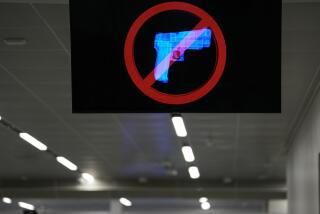Battered-Woman Defense Gains
The California Supreme Court has made it easier for some battered women to prove that they killed in self-defense and to win acquittals at trial. In this era of no-excuses criminal justice, some may fear that the courtâs ruling, issued last Thursday, could open the door to what one justice, in a separate concurring opinion, termed a âslippery slope of personalized defenses.â It should not.
Because the courtâs decision was limited, its application is likely to be limited as well. The courtâs ruling was the right one. And following its recent decision allowing limited exceptions to the âthree-strikes-and-youâre-outâ law, this unanimous ruling is yet another indication that the high court, a majority of whose members are considered political conservatives, may not be so neatly categorized.
Domestic violence is a complex national problem too long unrecognized. In 1995, law enforcement authorities logged more than 60,000 arrests for spousal abuse in California and 179 murders were attributed to domestic violence. Women were generally the victims.
Thursdayâs ruling applies to women who claim to suffer from âbattered womenâs syndrome.â Experts say that the pattern of violence experienced by women who are repeatedly abused can destroy their self-esteem, leaving them feeling powerless and perhaps leading them to respond violently. While some women do break free by contacting police or running away, many feel trapped because of lack of money and social confidence, social isolation and fear of reprisals.
Previously, juries could consider expert testimony about battered womenâs syndrome only to determine whether the woman honestly feared for her life, a finding that could justify a verdict of manslaughter rather than murder. This testimony could not be the basis for a self-defense acquittal because it did not address imminent physical threat, like a raised knife or pointed gun.
With the new ruling, California juries can consider expert testimony in deciding whether a âreasonable personâ in the defendantâs position would have felt life-threatening danger, the legal hurdle for acquittal on grounds of self-defense.
The justices overturned the voluntary manslaughter conviction of Evelyn Humphrey, who in 1992 shot and killed her companion, Albert Hampton. Humphrey admitted shooting Hampton but claimed she acted in self-defense. The jury heard an expert testify that the abuse she suffered was âabout as extreme a pattern as you could find.â
Writing for the Supreme Court, Justice Ming W. Chin said that âbecause evidence of battered womenâs syndrome may help the jury understand the circumstances in which the defendant found herself at the time of the killing, it is relevant to the reasonableness of her beliefâ about the danger she faced. A jury can give such expert testimony whatever weight it desires and the âultimate judgment of reasonableness is solely for the jury,â he said. Thatâs appropriate.
More to Read
Sign up for Essential California
The most important California stories and recommendations in your inbox every morning.
You may occasionally receive promotional content from the Los Angeles Times.










